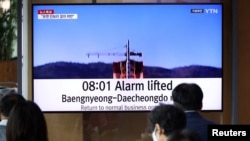South Koreans, who typically shrug off North Korean missile launches, were awakened Wednesday by air raid sirens and shelter warnings following an attempted North Korean satellite launch.
Just after 6:30 a.m. local time, cell phones in Seoul vibrated with loud alerts, along with an accompanying text message, warning residents to prepare to take shelter. For some, the message was labeled as a "wartime alert."
Outside on Seoul’s mostly empty streets, public emergency systems blasted sirens and verbal warnings, saying the young and elderly should be given evacuation priority – though the reason for the evacuation was never made clear.
Twenty-two minutes later, Seoul officials sent a follow-up text message saying the warning had been sent in error.
The warnings were prompted by a failed North Korean satellite launch. The missile carrying the satellite crashed into the sea about 200 kilometers west of the sparsely populated Eochang Island off South Korea’s west coast.
Though there appeared to be no signs of panic, the incident rattled many Seoul residents who have grown accustomed to North Korean launches.
"It was scary because I didn’t get any information (in the text message) about what the situation was and where to evacuate," said Seoul resident Choi Seul-gi, who works as a financial news broadcaster.
It is extremely rare for North Korean missiles to disrupt life in South Korea. That’s partly because of alarm fatigue – North Korea has launched more than 100 missiles since the beginning of last year.
Since most North Korean missiles head well out to sea, South Korean authorities almost never issue missile warnings. As a result, many Seoul residents do not even know when North Korea has conducted a launch.
"I’d never been in a situation like this before," said 16-year-old high school student Kim Ji-woo, who began packing an emergency bag with candy, other snacks, and a phone charger. "When the alarm went off, I felt like I had to do something, but no one told me what to do," Kim said.
Cho Sung-eun, a 34-year-old Seoul resident, considered waking her two-year-old son, but did not know where to evacuate if she did. "I didn't know where to go with a kid and how to prepare for it. It would have been helpful if there was a guide to where to evacuate," she said.
According to official figures, there are more than 3,000 officially designated emergency bomb shelters in the South Korean capital, which is well within North Korean artillery range. Nationwide, there are more than 17,000 shelters. But Wednesday's incident suggests many residents are not aware of shelters in their own community.
The two Koreas remain technically in a state of war, since their 1950s conflict ended in a truce instead of a peace treaty. Though it has been decades since major, sustained hostilities, the peninsula occasionally sees flare ups of military tensions, such as when North Korea conducts major weapons tests.
Wednesday's incident is likely to lead to questions about how Seoul should manage those periods of tensions without alarming the public.
At a press briefing Wednesday, Seoul Mayor Oh Se-hoon apologized for the confusion caused by the erroneous warnings.
Earlier, the Seoul city government had defended its approach, saying officials had erred on the side of caution when responding to a developing situation that was potentially dangerous.
But there is a danger that residents will ignore future alerts, said Mason Richey, associate professor at South Korea's Hankuk University of Foreign Studies.
"For me, the first concern is with false positives, like this – messages that are sent out in error. You condition people to not take these messages as seriously. And even if the delay in response to a true crisis is only a few seconds or a few minutes, that might actually make the difference between getting yourself to safety and not," Richey said.
South Korean officials may soon get the chance to do it all over again. North Korea on Wednesday acknowledged their satellite launch failed and said they will attempt another as soon as possible.






